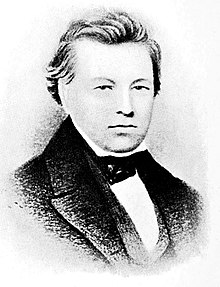John O'Donovan (scholar)
| John O'Donovan | |
|---|---|
 |
|
| Born | 25 July 1806 County Kilkenny, Ireland |
| Died | 10 December 1861 Dublin, Ireland |
| Residence | Kilkenny |
| Education | Hunt's Academy, Waterford |
| Known for | topographer |
| Home town | Kilcolumb, County Kilkenny |
John O'Donovan (Irish: Seán Ó Donnabháin; 25 July 1806 – 10 December 1861), from Atateemore, in the parish of Kilcolumb, County Kilkenny, and educated at Hunt's Academy, Waterford, was an Irish language scholar from Ireland.
He was the fourth son of Edmond O'Donovan and Eleanor Hoberlin of Rochestown. His early career may have been inspired by his uncle Parick O'Donovan. He worked for antiquarian James Hardiman researching state papers and traditional sources at the Public Records Office. He also taught Irish to Thomas Larcom for a short period in 1828 and worked for Myles John O'Reilly, a collector of Irish manuscripts.
Following the death of Edward O'Reilly in August 1830, he was recruited to the Topographical Department of the first Ordnance Survey of Ireland under George Petrie in October 1830. Apart from a brief period in 1833, he worked steadily for the Survey on place-name researches until 1842, unearthing and preserving many manuscripts. After that date, O'Donovan's work with the Survey tailed off, although he was called upon from time to time to undertake place-name research on a day-to-day basis. He researched maps and manuscripts at many libraries and archives in Ireland and England, with a view to establishing the correct origin of as many of Ireland's 63,000 townland names as possible. His letters to Larcom are regarded as an important record of the ancient lore of Ireland for those counties he documented during his years of travel throughout much of Ireland.
By 1845, O'Donovan was corresponding with the younger scholar William Reeves, and much of their correspondence to 1860 survives.
O'Donovan became professor of Celtic Languages at Queen's University, and was called to the Bar in 1847. His work on linguistics was recognised in 1848 by the Royal Irish Academy, who awarded him their prestigious Cunningham Medal. On the recommendation of Grimm, he was elected a corresponding member of the Royal Academy of Prussia in 1856.
...
Wikipedia
